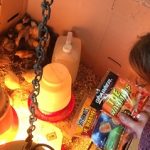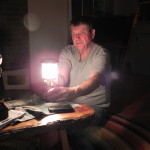Are You Prepared for a Power Outage?
Note: The below references to companies are Winding Pathways’ own experiences with quality products.
What Are Common Causes of Power Outages?
Usually, people lose electric power because of a tornado, hurricane, blizzard, or a windstorm that blows down trees. We were surprised that Pacific Gas and Electric planned a deliberate outage to prevent sparks from igniting a forest fire like the terrible one that destroyed the town of Paradise. CA, last year.
Interviews with impacted residents on the national news made us realize how unprepared many people are for the loss of electricity. Californians flocked to gas stations and grocery stores to stock up on fuel and food.
Preparation is Best

This powerful lantern runs several hours on the battery.
Humans are addicted to the flow of electrons we call electricity. Winding Pathways encourages everyone to prepare for times when power is not there. Several previous blogs detail how families can prepare to ride out an outage in relative comfort
Preparation is neither hard nor expensive. Check our past blogs for detail but here’s the short list of simple items to keep on hand in case the power goes off for a few days:
Basic Items to Consider
Food: A few days’ worth of non-perishable food beats not eating. Dehydrated meals keep nearly forever and canned goods also have a high storage life. When a blizzard approaches people flock to grocery stores to buy milk and bread. Neither is needed. And, milk will spoil if not kept cold. Keep powdered milk and crackers on hand just in case.
Light: Flashlights help people find their way around on dark nights, but they’re not too useful when lots of light is needed for reading or preparing a meal. Modern LED lanterns are ideal for general lighting. Our Milwaukee lamp was made for construction workers but throws out plenty of light and runs all night on one rechargeable battery. We keep a few batteries always charged. Many brands of lanterns are on the market. We recommend that people keep one in the closet to help on dark nights.
Fuel and backup heat: Rather than waiting in line at a gas station when power might go out, simply keep some gas in storage in the garage. Be sure to add a gas stabilizer to it. We rotate our gas in spring and fall by simply pouring the old gas into the car’s tank and then filling the can with fresh gas. We keep ten gallons in storage. Anyone living in a cold climate needs to have a backup plan in case the power goes off. Keeping pipes from freezing is important. See our earlier blogs for tips.
Water: Usually municipal water still flows even if the power goes off but it’s always a good idea to keep several gallons of clean water in storage just in case.
Readers can also go to the American Red Cross and ready.gov for excellent information on preparedness kits.
Modern people rely heavily on electricity but sometimes we have to make do without it.

Solar chargers help keep people connected when the power goes out.
Simple preparation makes waiting out an outage comfortable and easy.



